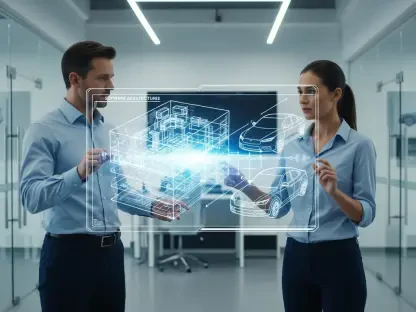Artificial Intelligence (AI) is rapidly revolutionizing the development of video editing applications by automating complex and repetitive tasks, improving overall efficiency, and making high-quality video production accessible to virtually everyone. The advent of AI technology is ushering in a new era of content creation, wherein users of all skill levels can produce videos that are professional and engaging. This remarkable technological advancement is changing the way we create content, making it not only faster and more efficient but also opening doors to unprecedented creative possibilities. By enhancing the capabilities of video editing apps, AI allows for the automation of tedious tasks, an improved user experience, and greater accessibility.
AI is reshaping the landscape of video editing by offering significant benefits such as automating repetitive tasks, enabling non-experts to create high-quality videos, enhancing efficiency, and personalizing content. These advancements are crucial for professionals working with large datasets and high-resolution content, as well as for smaller entities like freelancers and influencers who may not have extensive editing experience or resources.
Automation of Repetitive Tasks
One of the most significant advantages of AI in video editing is its ability to automate repetitive tasks that typically consume substantial time and effort. AI can efficiently handle activities including scene detection, color correction, and transcription, thereby liberating editors to concentrate on the more creative aspects of video production. For instance, Adobe Premiere Pro’s Sensei AI is adept at automatically adjusting aspect ratios for different social media platforms and detecting scene changes, streamlining the entire editing process.
AI-driven tools not only enhance productivity but also assure consistency and accuracy in the final product. By automating these mundane tasks, editors can allocate more time to refining the creative elements of their projects, ultimately leading to higher-quality videos. This automation is especially beneficial for professionals who need to manage large volumes of content efficiently.
Moreover, the capability of AI to learn and adapt over time signifies that these tools will become more proficient at handling repetitive tasks. As AI algorithms continue to advance, the scope of automation in video editing will expand, further reducing the manual workload for editors and enhancing overall productivity.
Accessibility for Non-Experts
AI-powered video editing applications are breaking down barriers and making high-quality video production accessible to users who have little to no editing experience. Apps such as Magisto and Lumen5 are prime examples that allow non-experts to create polished videos by leveraging AI to manage the technical aspects of editing. Magisto, for instance, analyzes raw footage to add transitions, effects, and music in a way that aligns with the video’s emotional tone, while Lumen5 effectively converts text into video storyboards, automatically selecting appropriate images and animations.
This democratization of video editing tools enables a broader audience to create compelling content without the need for specialized skills or extensive training. Social media influencers, small business owners, and freelancers can now produce professional-looking videos that enhance their online presence and effectively engage their audiences.
The user-friendly interfaces of these AI-driven apps further contribute to their accessibility. By simplifying the editing process and providing intuitive controls, these tools empower users to experiment with various styles and formats, fostering creativity and innovation in video production.
Improved Efficiency
AI significantly accelerates editing workflows by processing large datasets and handling high-resolution content at impressive speeds. This capability is particularly beneficial for professionals who need to work with substantial video files. A notable example is Runway ML’s AI, which can instantly remove a video’s background without the need for a green screen, thereby speeding up the editing process considerably.
The ability to process and analyze vast amounts of data in real-time allows editors to work more efficiently and meet tight deadlines. AI-driven tools can swiftly identify and correct issues such as lighting inconsistencies, audio imbalances, and visual artifacts, ensuring a smoother and more streamlined editing experience.
Furthermore, AI’s capacity to learn from previous edits and user preferences means that it can provide increasingly accurate and relevant suggestions over time. This continuous improvement in efficiency not only enhances the quality of the final product but also reduces the overall time and effort required for video editing.
Personalization
AI has the unique ability to tailor video content to specific styles or moods, significantly enhancing the video’s appeal and engagement factor. By adjusting elements such as music, transitions, and visual effects to match the intended emotional tone, AI ensures that each video resonates deeply with its audience. Applications like Magisto and Filmora leverage AI to make precise edits that align seamlessly with the desired aesthetic and narrative.
Personalization is a critical factor in crafting engaging and memorable video content. By utilizing AI to customize various aspects of the video, creators can ensure their content speaks directly to their target audience and effectively communicates the intended message. This level of personalization is immensely valuable for marketers and content creators who aim to build a strong brand identity and connect with their viewers on a deeper level.
Moreover, AI’s ability to analyze viewer preferences and behavior can inform future content creation strategies. By understanding which video elements are most effective in engaging the audience, creators can refine their approach and produce more impactful videos.
Cost Reduction
Artificial Intelligence (AI) is rapidly transforming the development of video editing applications by automating intricate and repetitive tasks, significantly boosting overall efficiency, and making high-quality video production accessible to almost everyone. With the rise of AI technology, we are entering a revolutionary era of content creation where individuals of all skill levels can easily create professional and captivating videos. This technological breakthrough is changing how we produce content, speeding up the process, and enhancing efficiency while unlocking new creative possibilities.
By elevating the features of video editing apps, AI streamlines tedious tasks, enhances user experience, and increases accessibility for a broader audience. The impact of AI on video editing is profound, offering benefits such as automation of repetitive tasks, enabling even those without extensive knowledge to produce high-quality videos, and personalizing content for various needs. These advancements are invaluable for professionals handling large datasets and high-resolution content, as well as for freelancers and influencers who may lack extensive editing skills or resources.









